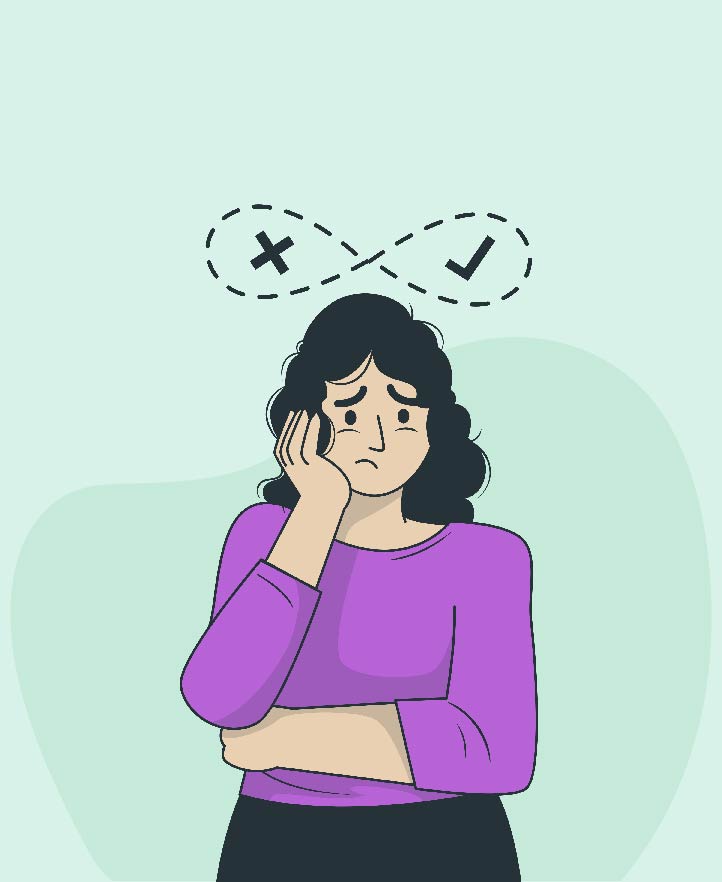

Treatment Options for OCD
Treatment options available for obsessive-compulsive disorder (OCD) can help manage this condition in a better way. There are also some self-help strategies that can offer additional effective results. Read on to know more.
Treatment for OCD
Several reports suggest that around 32 to 70% of individuals, who suffer from OCD, experience a reduction in symptoms through treatment. Popular and recommended OCD treatments include:
1. Medication
This is one of the recommended OCD treatments. Your doctor will share a prescription basis your symptoms and overall condition. Antidepressants are the primary suggested medication as they are effective towards managing OCD symptoms.
2. Psychological therapy
This treatment option can help in minimizing intensity of the symptoms and can also lower its frequency. The two major types of OCD therapy are:
1. Cognitive Behavioural Therapy (CBT)
In this type, a trained therapist guides you through the process of identifying and understanding troublesome thoughts that usually affect your behaviour. The main goal of CBT is to replace these disruptive thoughts with positive ones and improve the quality of life.
2. Exposure and Response Prevention (ERP)
This type of OCD therapy includes methodical exposure to things that can cause anxiety in your case. This enables you to learn new ways to cope with it, instead of taking shelter and running away from them.
Alternative Options of OCD treatment
This includes:
1. Intensive Residential Treatment (IRT)
This is an effective alternative treatment option available for patients with severe treatment-resistant OCD and who don’t effectively respond to standard outpatient treatment procedure. The duration of these programs is usually long-term and may yield noticeable results.
2. Deep Brain Stimulation (DBS)
This treatment method is generally reserved for adults who don’t respond to standard procedures. The treatment involves embedding electrodes in specific parts of the brain and using electrical impulses to control irregular notions.
3. Trans-cranial Magnetic Stimulation (TMS)
This method focuses on OCD treatment for adults between 22 to 68 years. This process involves the use of magnetic pulses delivered through an electromagnetic coil, placed around your forehead, in order to stimulate the nerve cells within your brain.
Self-help strategies
Here are some methods that can help you manage the symptoms on your own.
• Learn about the condition as this will help you understand the situation and deal with it in a better way.
• Managing anxiety can be helpful as anxiety and OCD are closely related to one another. This may help reduce the frequency of symptoms experienced.
• Exercising regularly can offer multiple health benefits. Some reports suggest that doing daily exercise can help reduce the severity and frequency of symptoms.
• Deal with stress as this too can trigger OCD symptoms. Indulging in relaxation techniques like a massage or listening to music can be helpful.
• Get adequate sleep
• Eat well & follow a follow diet
Conclusion
Obsessive-compulsive disorder (OCD) can impose variety of challenges in your daily life activities, but receiving proper care and medical treatment can help maintain a healthy life. There are multiple treatments and self-help strategies available, which can help your condition and enhance your quality of life.
One of the important components of our overall wellness is also being financially secured. Healthcare emergencies can happen any time, but a good health insurance policy can protect you from such uncertain situations. To know more about Wellness and other health related tips, visit the Wellness Corner
Source: verywellmind, mind.org.uk, mayoclicnic
Disclaimer: This blog provides general information and discussions about health and related subjects. The information and other content provided in this blog, website or in any linked materials are not intended and should not be considered, or used as a substitute for, medical advice, diagnosis or treatment. Kindly contact your Doctor before starting a new medicine or health regime.
Related Articles
Know the Difference Between OCD and Generalized Anxiety
What is Anxiety Disorders - Symptoms, Causes, Diagnosis & Treatment
Mental/Psychological Issues Covered under Health Policy
Things to Know About Mental Health Coverage
Published on September 18, 2023


 Health Insurance
Health Insurance  Travel Insurance
Travel Insurance  Car Insurance
Car Insurance  Cyber Insurance
Cyber Insurance  Critical Illness Insurance
Critical Illness Insurance
 Pet Insurance
Pet Insurance
 Bike/Two Wheeler Insurance
Bike/Two Wheeler Insurance  Home Insurance
Home Insurance  Third Party Vehicle Ins.
Third Party Vehicle Ins.  Tractor Insurance
Tractor Insurance  Goods Carrying Vehicle Ins.
Goods Carrying Vehicle Ins.  Passenger Carrying Vehicle Ins.
Passenger Carrying Vehicle Ins.  Compulsory Personal Accident Insurance
Compulsory Personal Accident Insurance  Travel Insurance
Travel Insurance  Rural
Rural